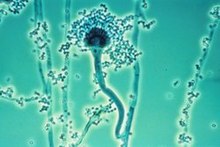Leibniz Institute for Natural Product Research and Infection Biology
| Leibniz Institute for Natural Product Research and Infection Biology Hans Knöll Institute |
|
|---|---|
| Category: | research Institute |
| Carrier: | legally independent |
| Legal form of the carrier: | Registered association |
| Membership: | Leibniz Association |
| Facility location: | Jena |
| Type of research: | Basic research |
| Subjects: | Natural sciences , life sciences |
| Areas of expertise: | Microbiology , molecular biology , infection biology |
| Basic funding: | Federal government (50%), states (50%) |
| Management: | Axel Brakhage (scientific), Elke Jäcksch (adm.) |
| Employee: | approx. 380 |
| Homepage: | www.leibniz-hki.de |
The Leibniz Institute for Natural Product Research and Infection Biology - Hans Knöll Institute (HKI) is a non-university research institution based on the Beutenberg Campus in Jena and is assigned to application-oriented basic research in the life sciences . The institute is a member of the Gottfried Wilhelm Leibniz Scientific Community (WGL). The HKI is managed in a private legal form as a registered association .
history
The founding of today's institute goes back to Hans Knöll in the early 1940s. In 1942 Knöll realized the first large-scale penicillin production on the European mainland in Jena . Under his leadership as the first director of VEB Jenapharm, the "Institute for Microbiology and Experimental Therapy" (IMET) was built on the Beutenberg and opened in 1953. In 1956 IMET was taken over by the German Academy of Sciences in Berlin and in 1970 the institute was renamed the Central Institute for Microbiology and Experimental Therapy (ZIMET).
After the reunification and the dissolution of the Academy of Sciences of the GDR, today's institute was re-established with effect from January 1, 1992. On the basis of a recommendation by the Science Council in 2000, the HKI was included in the joint funding provided by the federal government and the federal states as a Blue List institution . The HKI became a member of the Leibniz Association on January 1, 2003.
Since 2005 the institute has been called "Leibniz Institute for Natural Product Research and Infection Biology - Hans Knöll Institute".
Research and Development
Research at the HKI focuses on the search for microorganisms and their characterization and research into communication with their host organism . The biotechnological extraction of natural substances is another focus of our work. The technologies required for this are brought to patent maturity and implemented in cooperation with industrial partners. The institute thus takes on the function of a transfer point between basic research and technical application. The close integration of the working groups allows for integrated operation, which includes the spin-off facilitates own companies. So far, seven companies have emerged on the basis of HKI know-how.
Classical natural product research, which at the HKI focuses on low molecular weight natural substances as mediators of biological communication , has been gradually supplemented over the years by modern methods of cell and molecular biology . The focus of basic research is infection biology . Infection biology focuses on the human pathogenic fungi Candida albicans and Aspergillus fumigatus , they are the cause of mycoses , which are difficult to treat.
The combination of both areas - natural product research and infection biology - results in synergistic effects that enable both a better understanding of life-threatening infections and the development of new therapeutically effective substances.
Cooperations
The HKI works closely with the Friedrich Schiller University Jena (FSU). The department heads at the HKI are usually professors from the Biological-Pharmaceutical Faculty of the FSU.
In addition to numerous national research collaborations, the HKI maintains international research collaborations with over 60 partners and has successfully spun off some industry-related departments .
Infrastructure
Axel A. Brakhage has been head of the institute as Scientific Director since 2005, while Elke Jäcksch is the Administrative Director.
More than 300 people work in the institute, including more than 100 doctoral students.
The total budget of the institute in 2006 was 15.1 million euros, of which around 11.3 million euros were funded half by the federal government ( BMBF ) and half by the federal states.
Web links
Coordinates: 50 ° 54 ′ 32.1 " N , 11 ° 34 ′ 23.3" E
